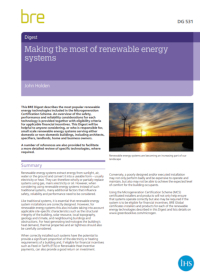Making the most of renewable energy systems DG 531
Making the most of renewable energy systems (DG 531) was written by John Holden and published on 30 June 2014. BRE (Building Research Establishment) is an independent, research-based consultancy, testing and training organisation, operating in the built environment and associated industries.
Renewable energy systems extract energy from sunlight, air, water or the ground and convert it into a useable form – usually electricity or heat. They can wholly or partially replace systems using gas, mains electricity or oil. However, when considering using renewable energy systems instead of such traditional systems, many additional factors that influence safety, reliability and performance need to be considered.
This 12-page BRE Digest describes the most popular renewable energy technologies included in the Microgeneration Certification Scheme. It provides an overview of the safety, performance and reliability considerations for each technology, together with eligibility criteria for financial incentives.
It is intended for anyone considering, or responsible for, small-scale renewable energy systems serving domestic or non-domestic buildings. This includes architects, specifiers, landlords, home and business owners. A number of references are provided for a more detailed review of specific technologies.
Its contents are:
- Introduction.
- Performance.
- Reliability.
- Feed-in Tariffs.
- Solar thermal collectors.
- Renewable Heat Incentive.
- Biomass.
- Small and micro wind turbines.
- The Microgeneration Certification Scheme.
[edit] Related articles on Designing Buildings Wiki
- BRE articles on Designing Buildings Wiki.
- BRE Buzz articles on Designing Buildings Wiki.
- BREEAM Energy efficient equipment
- BREEAM Free cooling
- BREEAM Low carbon design
- BREEAM LZC technologies
- BREEAM Passive design
- BREEAM Reduction of energy use and carbon emissions
- BREEAM.
- Building Research Establishment.
- Financing our future energy infrastructure
- Geothermal energy.
- Microgeneration Certification Scheme.
- Renewable energy.
- Solar photovoltaics
- Solar thermal systems.
- Tidal lagoon power.
- Types of fuel.
- Wind Energy in the United Kingdom.
- Wind farm.
- Wind turbine.
Featured articles and news
The UK's Modern Industrial Strategy: A 10 year plan
Previous consultation criticism, current key elements and general support with some persisting reservations.
Building Safety Regulator reforms
New roles, new staff and a new fast track service pave the way for a single construction regulator.
Architectural Technologist CPDs and Communications
CIAT CPD… and how you can do it!
Cooling centres and cool spaces
Managing extreme heat in cities by directing the public to places for heat stress relief and water sources.
Winter gardens: A brief history and warm variations
Extending the season with glass in different forms and terms.
Restoring Great Yarmouth's Winter Gardens
Transforming one of the least sustainable constructions imaginable.
Construction Skills Mission Board launch sector drive
Newly formed government and industry collaboration set strategy for recruiting an additional 100,000 construction workers a year.
New Architects Code comes into effect in September 2025
ARB Architects Code of Conduct and Practice available with ongoing consultation regarding guidance.
Welsh Skills Body (Medr) launches ambitious plan
The new skills body brings together funding and regulation of tertiary education and research for the devolved nation.
Paul Gandy FCIOB announced as next CIOB President
Former Tilbury Douglas CEO takes helm.
UK Infrastructure: A 10 Year Strategy. In brief with reactions
With the National Infrastructure and Service Transformation Authority (NISTA).
Ebenezer Howard: inventor of the garden city. Book review.
The Grenfell Tower fire, eight years on
A time to pause and reflect as Dubai tower block fire reported just before anniversary.
Airtightness Topic Guide BSRIA TG 27/2025
Explaining the basics of airtightness, what it is, why it's important, when it's required and how it's carried out.
Construction contract awards hit lowest point of 2025
Plummeting for second consecutive month, intensifying concerns for housing and infrastructure goals.
Understanding Mental Health in the Built Environment 2025
Examining the state of mental health in construction, shedding light on levels of stress, anxiety and depression.























